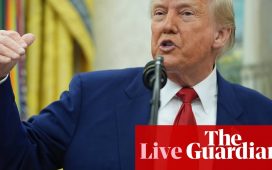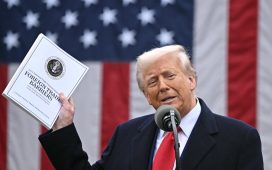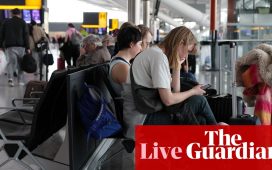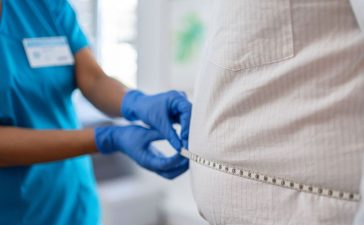Introduction: European Central Bank expected to cut interest rates today
Good morning, and welcome to our rolling coverage of business, the financial markets and the world economy.
The welcome slowdown in global inflation is clearing the way for central banks to pull down interest rates, and today the spotlight falls on the European Central Bank.
The ECB is expected to make its third rate cut of the year today, putting it two cuts ahead of the Bank of England. Policymakers are under pressure to cut after eurozone inflation was estimated to fall below the ECB’s 2% target in September (we get the final reading today too).
Economists predict the ECB will cut its deposit rate by another quarter-point today, to 3.25%, as its governing council meets in Ljubljana, Slovenia, today. President Christine Lagarde is also expected to leave the door wide open for another cut in December.
With European countries such as Germany struggling this year, lower interest rates would be welcomed by business and consumers across the eurozone.
Last week, Greece’s central bank governor Yannis Stournaras piled pressure on the governing council, dclaring that “highly restrictive” interest rates could be lowered faster than previously anticipated.
Neil Hutchison, European liquidity strategies portfolio manager at J.P. Morgan Asset Management, says it would be a surprise if the ECB don’t cut today:
“With Halloween on the horizon, we’re not expecting any scary surprises from the ECB this week. Spooked by weaker PMI business survey data, the ECB is likely to deliver a 0.25% rate cut.
Recent cooling in inflation data means they’re less burdened by potential price pressures. With minimal pushback from ECB members, markets would be surprised if a cut didn’t happen.
Beyond this meeting, the outlook is currently enveloped in a Halloween haze, with concerns over a potential growth slowdown and geopolitical tensions, amid resilient wage growth and low unemployment.”
The agenda
-
10am BST: Eurozone inflation estimate for September (final reading)
-
1.15pm BST: European Central Bank sets interest rates
-
1.30pm BST: US retail sales for September
-
1.30pm: US weekly jobless claims
-
1.45pm BST: European Central Bank press conference
-
Tonight: Annual City Banquet at Mansion House
Key events
Gold hits another record high
The gold price has climbed to a new alltime high this morning.
Bullion hit $2,688.82 per ounce for the first time, lifted by forecasts of interest rate cuts and uncertainty ahead of next month’s US election:
Kelvin Wong, OANDA senior market analyst for Asia Pacific.
“Investors are seeking safe-haven gold as a hedge amid uncertainty over the U.S. election. A Trump presidency should support gold as it might raise trade tensions and widen the budget deficit.”
Gold has gained around 30% this year, as investors have flocked to the classic safe-haven asset.
As gold doesn’t actually offer a yield, it can be favoured by lower interest rates. It is also seen as a hedge against inflation, so its recent rally may suggest fears that inflation will be more persistent than hoped.
Shares in mining giant Anglo American have jumped over 3% this morning, amid talk that rival BHP could make a new bid for the company soon.
The Financial Times has reported that BHP chief executive Mike Henry met government officials in South Africa last week, fuelling speculation that the Australian miner will resurrect its failed £39bn bid for Johannesburg-based rival Anglo American.
Henry and chief development officer Catherine Raw reportedly met South Africa government officials and the Public Investment Corporation, the state-owned asset manager.
Back in late May, BHP walked away from Anglo after failing to win the board’s support for its proposal. That triggered a City rule that means it can’t bid again for six months, a period that ends on 29 November.
Back in the City, Deliveroo has reported a rise in orders over the latest quarter, amid “healthy” growth in the UK and Ireland.
Order numbers rose by 2% to 71.1 million, while the gross transaction value (GTV) of its orders grew by 5% to £1.78bn for the three months to September.
The takeaway delivery specialist told shareholders it has made progress in “a more stable but still uncertain consumer environment”.
It said adjusted earnings for the full year are now on track to be in the “upper half” of its £110m to £130m range.
Wonk news: Paul Johnson, the Director of the Institute for Fiscal Studies, is stepping down next summer after a 14-year stint leading the influential thinktank.
He’s off to run Queen’s College, Oxford.
Johnson, whose rapid analysis of UK budgets has been invaluable over the years, says:
“This really is a bittersweet moment. I first started at the IFS as a brand new graduate back in 1988, leaving in 1998 and returning as director in 2011.
The IFS has been an incredibly important part of my life. I love it, what it does and what stands for, and all my amazing colleagues. But after 14 years at the helm, it feels like the right time to move on and start a new chapter in my life.”
Johnson’s immediate predecessor, Robert Chote, was recently appointed as President of Trinity College Oxford, while his predecessor Andrew Dilnot has led two colleges – St Hugh’s and Nuffield.
French spirits maker Pernod Ricard has been hit by weakness in China.
Pernod Ricard, whose brands include Martell cognac, Mumm champagne and Absolut vodka, has reported an 8.5% drop in sales in the last quarter.
Sales in China fell by 26%, which the company blamed on “a challenging macroeconomic environment with weak consumer demand over the summer and into the Mid-Autumn Festival”.
Eurozone inflation lower than first thought
Newsflash: Inflation across the eurozone fell by more than initially thought last month, which may cement the chances of interest rate cuts today.
Consumer prices across the euro area rose by 1.7% in the year to September, statistics body Eurostat reports, down from 2.2% in August.
That matches inflation in the UK last month, and confirms that eurozone inflation was below the European Central Bank’s 2% target.
Eurostat reports that energy prices fell by 6.1% year-on-year, while services prices rose by 3.9%, food, alcohol & tobacco by 2.4% and goods by 0.4%.
Eurozone inflation had initially been estimated at 1.8% in September, in Eurostat’s ‘flash’ reading at the start of this month.
Eurostat reports:
The lowest annual rates were registered in Ireland (0.0%), Lithuania (0.4%), Slovenia and Italy (both 0.7%). The highest annual rates were recorded in Romania (4.8%), Belgium (4.3%) and Poland (4.2%).
Compared with August 2024, annual inflation fell in twenty Member States, remained stable in two and rose in five.
Government source: We aren’t reviving HS2 phase 2
Westminster insiders are playing down this morning’s reports that it will reverse Rishi Sunak’s decision to only run the HS2 rail line from London to Birmingham.
Asked about reports it will revive HS2 to Crewe (see 8.45am), a government source said:
“We have always said we won’t be taking plans for HS2 phase 2 back off the shelf after the Conservatives took a wrecking ball to the project and allowed costs to spiral completely out of control.
“But we are committed to delivering better rail connectivity across the north, as set out in our manifesto.
“Transport is an essential part of the Government’s mission to rebuild Britain and grow our economy.”
Nestlé: Consumer demand has weakened in recent month
Consumer goods maker Nestlé has reported that demand has weakened, after its sale fell during the first nine months of this year.
Nestlé has cut its outlook for sales this year, and now expects organic sales to rise by 2%, down from at least 3% expected before.
Total sales in 2024 have dropped to 67.1bn Swiss francs, down from 68.8bn in the first three quarters of 2023.
The company has hiked its prices of its products – which include bottled water, coffee, pet food and ice cream – by 1.6% this year, a slowdown following “unprecedented increases in the prior two years”, it reports.
Laurent Freixe, Nestlé CEO, says:
“We delivered organic sales growth, driven by positive real internal growth. Consumer demand has weakened in recent months, and we expect the demand environment to remain soft.
Given this outlook and our further actions to reduce customer inventories in the fourth quarter, we have updated our full-year guidance, with organic sales growth expected to be around 2%, in line with the first nine months.
Freixe, who took control last month, has also announced plans to streamline Nestlé’s management structure, merging its Latin America and North America units, and putting Greater China into its Asia, Oceania and Africa businesses.
Christine Lagarde may be questioned about the proposed merger between Italy’s UniCredit and Germany’s Commerzbank at today’s press conference.
Last month, Lagarde said that such cross-border mergers were desirable, after Unicredit lifted its stake in Commerzbank.
Lagarde argued that it would show that efforts to integrate Europe’s financial markets such as the banking union, were paying off.
Berlin doesn’t agree, though – there’s been a political backlash to the idea, with chancellor Olaf Scholz calling the Italian move “an unfriendly attack”.
German officials fear that they could end up footing the bill if UniCredit were to be dragged into an Italian debt crisis, for example.
But as Simon Nixon argues here, the deal makes sense, though there is unease over the way Unicredit amassed its stake, including buying some Commerzbank shares sold by the German government.
Wealth manager St James’s Place has warned that this month’s budget is “compounding” unpredictability in the investment market.
In its latest results this morning, St James’s Place says:
The macroeconomic environment has improved since the beginning of the year, but there continues to be uncertainty in the outlook for consumers, savers and investors.
The company, which is overhauling its fee structure under pressure from regulators, also reported net inflows of £890m in the third quarter of the year.
LBC: HS2 will run from Euston to Crewe
The future of the HS2 rail line could soon be decided.
LBC are reporting that the government will soon announce that HS2 will run from London Euston to Crewe.
According to the LBC report, state-owned HS2 LTD will not oversee the extension to Crewe, and the multi-billion-pound project will be handed to a private sector consortium instead.
LBC say:
According to sources close to the project, Ministers have re-evaluated the cost-benefit of HS2 and concluded the line should continue beyond Birmingham – reversing a decision made by the then-Prime Minister Rishi Sunak at his party’s conference last year.
A year ago, Sunak scrapped the northern leg of HS2, meaning it would start in Birmingham, rather than Manchester.
Under that plan, the line would terminate outside central London at Old Oak Common – unless private investment would pay for it to reach Euston.
Last week, cabinet minister Lisa Nandy hinted that a cut-price “HS2-lite” would run from Birmingham to Crewe
Rail industry analysis has shown that runing the line from Crewe to Euston would make financial sense.
Euro weakest since early August
The euro has dipped to its lowest level in two and a half months, as investors anticipate a cut from the European Central Bank today.
The single currency has dropped to $1.0847 this morning, the lowest since 2nd August.
It’s been weakening through October, having hit $1.12 at the end of September.
Kathleen Brooks, research director at XTB, suggests the euro has further to fall if the ECB sounds dovish today.
The ECB has little choice but to cut. Germany’s economy is continuing to show signs of struggle. German investor confidence was weaker than expected this week, and a number of Eurozone economies have extremely low levels of inflation.
As we lead up this meeting, EUR/USD has made a fresh 2-month low and is back trading around $1.0850. There is a lot of expectation already priced into the market, however, momentum is to the downside for the euro, and a dovish tilt from the ECB could exacerbate the euro even more.
There’s a flurry of takeover drama in the City this morning.
N Brown Group, the online fashion retailer, has agreed to be taken over in a £191m deal, led by its fourth largest shareholder, Joshua Alliance.
The recommended cash acquisition is worth 40p per share, nearly a 50% premium to N Brown’s closing share price last night.
This morning, shares have jumped to 38.5p.
Joshua Alliance owns 6.6% of the company’s shares, while almost half is owned by his father, Lord David Alliance of Manchester, who formerly chaired the company [and also played a key role in the rescue of 20,000 Ethiopian Jews from Sudan].
Overall, the Alliance Family Concert Party own 53.4% of its shares, and are backing the deal.
Mike Ashley’s Frasers Group owns 20% – one of Ashley’s many interests in UK retailers.
Uber could create ‘super app’ through bid for Expedia
Shares in Expedia, the nearly $20bn US travel booking website, are set to rally today following reports that transport and delivery firm Uber has explored a possible bid.
Uber, the Financial Times reports, has approached advisers in recent months to examine whether such a deal would be possible and how it could be structured.
It would be Uber’s bigger acquisition yet, and give it access to new growth opportunities. However, the situation is still at an early stage, as a formal approach hasn’t yet been made to Expedia and the two sides aren’t in discussions.
A deal would help Uber transform itself into a ‘super app’, offering users a wide range of services through a single application as Chinese tech groups such as WeChat already do well.
Intriguingly, Uber’s CEO Dara Khosrowshahi was previously the chief executive of Expedia.
Expedia’s shares have jumped by 7.2% in after-hours trading on Wall Street, while Uber’s shares have dropped by 2.9%.
Introduction: European Central Bank expected to cut interest rates today
Good morning, and welcome to our rolling coverage of business, the financial markets and the world economy.
The welcome slowdown in global inflation is clearing the way for central banks to pull down interest rates, and today the spotlight falls on the European Central Bank.
The ECB is expected to make its third rate cut of the year today, putting it two cuts ahead of the Bank of England. Policymakers are under pressure to cut after eurozone inflation was estimated to fall below the ECB’s 2% target in September (we get the final reading today too).
Economists predict the ECB will cut its deposit rate by another quarter-point today, to 3.25%, as its governing council meets in Ljubljana, Slovenia, today. President Christine Lagarde is also expected to leave the door wide open for another cut in December.
With European countries such as Germany struggling this year, lower interest rates would be welcomed by business and consumers across the eurozone.
Last week, Greece’s central bank governor Yannis Stournaras piled pressure on the governing council, dclaring that “highly restrictive” interest rates could be lowered faster than previously anticipated.
Neil Hutchison, European liquidity strategies portfolio manager at J.P. Morgan Asset Management, says it would be a surprise if the ECB don’t cut today:
“With Halloween on the horizon, we’re not expecting any scary surprises from the ECB this week. Spooked by weaker PMI business survey data, the ECB is likely to deliver a 0.25% rate cut.
Recent cooling in inflation data means they’re less burdened by potential price pressures. With minimal pushback from ECB members, markets would be surprised if a cut didn’t happen.
Beyond this meeting, the outlook is currently enveloped in a Halloween haze, with concerns over a potential growth slowdown and geopolitical tensions, amid resilient wage growth and low unemployment.”
The agenda
-
10am BST: Eurozone inflation estimate for September (final reading)
-
1.15pm BST: European Central Bank sets interest rates
-
1.30pm BST: US retail sales for September
-
1.30pm: US weekly jobless claims
-
1.45pm BST: European Central Bank press conference
-
Tonight: Annual City Banquet at Mansion House








